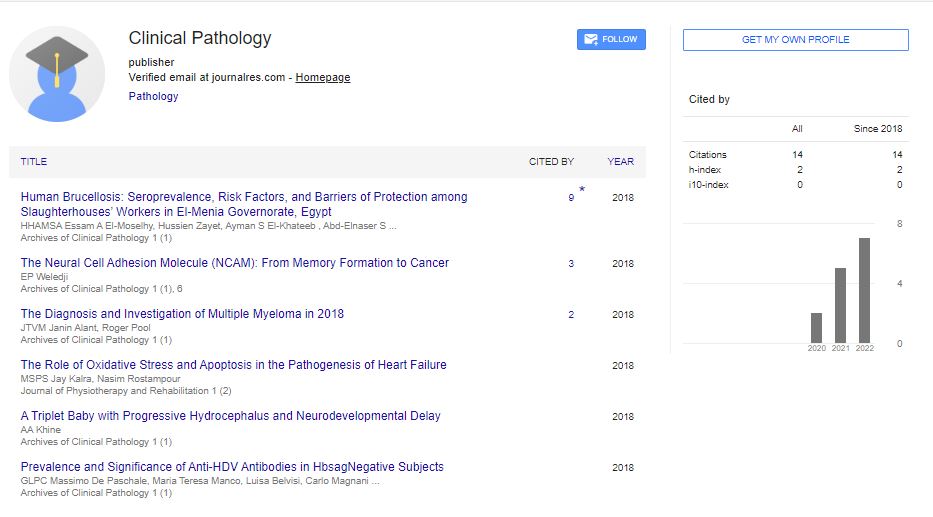Short Communication, Arch Clin Pathol Vol: 8 Issue: 0
The Power of Immunological Testing in Diagnostic Medicine
Shiyi Yin*
Department of Chemistry and Chemical Engineering, Hunan University, Changsha, China
*Corresponding Author: Shiyi Yin
Department of Chemistry and Chemical
Engineering, Hunan University, Changsha, China
E-mail: yin@shiyin.hu.cn
Received date: 28 May, 2023, Manuscript No. ACPY-23-107077
Editor assigned date: 31 May, 2023, Pre QC No. ACPY-23-107077 (PQ);
Editor assigned date: 31 May, 2023, Pre QC No. ACPY-23-107077 (PQ);
Revised date: 22 June, 2023, Manuscript No. ACPY-23-107077 (R);
Published date: 28 June, 2023, DOI: 2324-8955/acpy.05.03.100090
Citation: Yin S (2023) The Power of Immunological Testing in Diagnostic Medicine. Arch Clin Pathol 6:2.
Description
Immunological testing plays a pivotal role in diagnostic medicine, providing valuable insights into the functioning of the immune system and aiding in the detection, diagnosis, and monitoring of various diseases. The power of immunological testing lies in its ability to detect specific immune responses, identify immune markers, and assess the overall immune status of an individual. This study discuss the applications, advantages, and advancements in immunological testing, highlighting its significance in diagnostic medicine [1].
Immunological testing involves the measurement and analysis of various components of the immune system, such as antibodies, antigens, cytokines, and immune cells. These tests can be performed using different techniques, including Enzyme-Linked Immunosorbent Assays (ELISA), immunofluorescence, flow cytometry, and molecular methods like Polymerase Chain Reaction (PCR). The information obtained from these tests helps healthcare professionals gain insights into the immune response to pathogens, autoimmune disorders, allergies, and other immune-related conditions [2].
One of the key applications of immunological testing is the diagnosis of infectious diseases. By detecting specific antibodies or antigens associated with pathogens, healthcare providers can identify the presence of an infection and determine the causative agent. For example, serological tests such as ELISA can detect antibodies produced in response to viral infections like HIV, hepatitis, or bacterial infections like Lyme disease [3]. Rapid Diagnostic Tests (RDTs) utilizing immune chromatographic techniques have also become invaluable in the rapid and accurate diagnosis of infectious diseases, particularly in resource-limited settings [4].
Immunological testing also plays a vital role in the diagnosis of autoimmune disorders. Autoimmune diseases occur when the immune system mistakenly targets and attacks the body's own tissues. Immunological tests can help detect autoantibodies, which are antibodies that target self-antigens. For instance, the presence of Antinuclear Antibodies (ANAs) is a hallmark of Systemic Lupus Erythematosus (SLE), while the presence of Rheumatoid Factor (RF) is associated with Rheumatoid Arthritis (RA). These tests aid in confirming the diagnosis, assessing disease activity, and guiding treatment decisions [5].
Allergy testing is another important application of immunological testing. It helps identify specific allergens that trigger allergic reactions in individuals [6]. Skin prick tests and specific IgE blood tests can determine an individual's sensitization to common allergens such as pollen, dust mites, pet dander, and food allergens. These tests help in diagnosing allergies, guiding allergen avoidance strategies, and formulating personalized treatment plans, including allergen immunotherapy.
Immunological testing also plays a significant role in monitoring the immune response to vaccines. By measuring vaccine-specific antibodies, healthcare providers can assess the effectiveness of vaccination and determine if an individual has developed adequate immunity against a particular pathogen [7]. This is particularly important in the context of widespread vaccination programs, as it helps evaluate the vaccine's impact on population immunity and identify individuals who may require additional booster doses [8].
Furthermore, immunological testing has revolutionized the field of cancer diagnostics and treatment. Tumor markers, which are specific substances produced by cancer cells or in response to cancer, can be detected using immunological techniques. Examples include Prostate- Specific Antigen (PSA) for prostate cancer and Carcinoembryonic Antigen (CEA) for colorectal cancer [9]. These tests aid in cancer screening, diagnosis, monitoring treatment response, and detecting cancer recurrence.
Advancements in immunological testing have significantly enhanced its accuracy, sensitivity, and specificity. Novel techniques, such as multiplex assays and high-throughput sequencing, allow for the simultaneous measurement of multiple analyses and the analysis of large-scale immune profiles. These approaches enable a more comprehensive assessment of the immune system, facilitating the identification of specific immune signatures associated with diseases [10].
Conclusion
Immunological testing has revolutionized diagnostic medicine, offering powerful tools for the detection, diagnosis, and monitoring of various diseases. By assessing immune responses, measuring immune markers, and evaluating immune status, immunological testing provides dire information that guides clinical decision-making. Its applications span infectious diseases, autoimmune disorders, allergies, vaccination, cancer diagnostics, and beyond. Continued advancements in immunological testing techniques for further enhancing its diagnostic capabilities, contributing to improved patient outcomes, and advancing personalized medicine.
References
- Scott HJ (2014) The challenges, advantages and future of phenome‐wide association studies. Immunology 141(2): 157-165.
- Rad HA, Reza T, Morad G, Sharareh N, Vaghef ME (2013) Might patients with immune-related diseases benefit from probiotics?. Nutrition 29(3): 583-586.
- Morga M, Nathwani D (1992) Facial palsy and infection: the unfolding story. Clin Infect Dis 14(1): 263-271.
- Lee WG, Kim YG, Chung BG, Demirci U, Khademhosseini A (2010) Nano/Microfluidics for diagnosis of infectious diseases in developing countries. Adv Drug Deliv Rev 62(4-5): 449-457.
- Paul KY, Stanley MC, Joseph KL (2017) ACG clinical guideline: evaluation of abnormal liver chemistries. Am J Gastroenterol 112(1): 18-35.
- Scott HS, Robert AW, Abramson S, Bradley EC, Thomas F et al., (2012) Allergy testing in childhood: using allergen-specific IgE tests. Pediatrics 129(1): 193-197.
- Randolph HE, Luis BB (2020) Herd immunity: understanding COVID-19. Immunity 52(5):737-741.
- Lahariya C (2016) Vaccine epidemiology: A review. Fam Med. Prim Care Rev 5(1): 7-15.
- Duffy MJ (2001) Carcinoembryonic antigen as a marker for colorectal cancer: is it clinically useful?. Clin. Chem 47(4): 624-630.
- Ginos, Matthew A, Page GP, Michalowicz BS, Patel KJ, Volker SE et al., (2004) Identification of a gene expression signature associated with recurrent disease in squamous cell carcinoma of the head and neck. Cancer Res 64(1): 55-63.
 Spanish
Spanish  Chinese
Chinese  Russian
Russian  German
German  French
French  Japanese
Japanese  Portuguese
Portuguese  Hindi
Hindi 